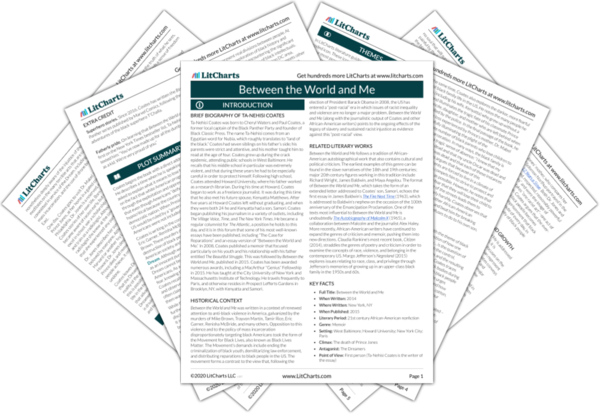Samori Coates Quotes in Between the World and Me
Son,
Last Sunday the host of a popular news show asked me what it meant to lose my body. The host was broadcasting from Washington, D.C., and I was seated in a remote studio on the far west side of Manhattan. A satellite closed the miles between us, but no machinery could close the gap between her world and the world for which I had been summoned to speak.
All our phrasing—race relations, racial chasm, racial justice, racial profiling, white privilege, even white supremacy––serves to obscure that racism is a visceral experience, that it dislodges brains, blocks airways, rips muscle, extracts organs, cracks bones, breaks teeth. You must never look away from this. You must always remember that the sociology, the history, the economics, the graphs, the charts, the regressions all land, with great violence, upon the body.
For so long I have wanted to escape into the Dream, to fold my country over my head like a blanket. But this has never been an option because the Dream rests on our backs, the bedding made from our bodies. And knowing this, knowing that the Dream persists by warring with the known world, I was sad for the host, I was sad for all those families, I was sad for my country but above all, in that moment, I was sad for you.
She said to me, “You take care of my daughter.” When she got out of the car, my world had shifted. I felt that I had crossed some threshold, out of the foyer of my life and into the living room. Everything that was the past seemed to be another life. There was before you, and then there was after, and in this after, you were the God I’d never had. I submitted before your needs, and I knew then that I must survive for something more than survival’s sake. I must survive for you.
The entire narrative of this country argues against the truth of who you are.
Here is what I would like for you to know: In America, it is traditional to destroy the black body––it is heritage.

Samori Coates Quotes in Between the World and Me
Son,
Last Sunday the host of a popular news show asked me what it meant to lose my body. The host was broadcasting from Washington, D.C., and I was seated in a remote studio on the far west side of Manhattan. A satellite closed the miles between us, but no machinery could close the gap between her world and the world for which I had been summoned to speak.
All our phrasing—race relations, racial chasm, racial justice, racial profiling, white privilege, even white supremacy––serves to obscure that racism is a visceral experience, that it dislodges brains, blocks airways, rips muscle, extracts organs, cracks bones, breaks teeth. You must never look away from this. You must always remember that the sociology, the history, the economics, the graphs, the charts, the regressions all land, with great violence, upon the body.
For so long I have wanted to escape into the Dream, to fold my country over my head like a blanket. But this has never been an option because the Dream rests on our backs, the bedding made from our bodies. And knowing this, knowing that the Dream persists by warring with the known world, I was sad for the host, I was sad for all those families, I was sad for my country but above all, in that moment, I was sad for you.
She said to me, “You take care of my daughter.” When she got out of the car, my world had shifted. I felt that I had crossed some threshold, out of the foyer of my life and into the living room. Everything that was the past seemed to be another life. There was before you, and then there was after, and in this after, you were the God I’d never had. I submitted before your needs, and I knew then that I must survive for something more than survival’s sake. I must survive for you.
The entire narrative of this country argues against the truth of who you are.
Here is what I would like for you to know: In America, it is traditional to destroy the black body––it is heritage.











